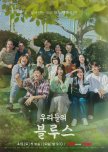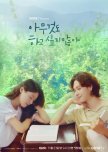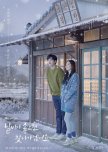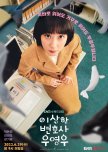 Kim Gab Soo Showers Praise on His "Queen of Tears" Co-Stars Kim Soo Hyun, Kim Ji Won
Kim Gab Soo Showers Praise on His "Queen of Tears" Co-Stars Kim Soo Hyun, Kim Ji Won "My Liberation Notes" racconta la storia di tre fratelli e uno sconosciuto nel villaggio di Sanpo. Yeom Chang Hee è il secondo dei tre fratelli. Vuole scappare dalla casa della sua famiglia, ma non ha un sogno e trascorre la sua vita senza senso. È guardato dall'alto in basso dai membri della sua famiglia. Yeom Mi Jung è la sorella minore. Vorrebbe liberarsi della sua vita noiosa, ma è introversa e timida. È sola e si sente insoddisfatta. Yeom Ki Jung è la sorella maggiore. Ha un carattere impulsivo. Perde un sacco di tempo facendo la pendolare dal villaggio di Sanpo al suo lavoro a Seoul. La sua vita è piena di lamentele e vuole trovare l'amore. Il signor Goo è un uomo misterioso sempre ubriaco, che appare improvvisamente nel villaggio. Un giorno, Yeom Mi Jung lo avvicina. (Fonte: Inglese = Asianwiki || Traduzione = Aurora su MyDramaList) Modifica la Traduzione
- Italiano
- 中文(台灣)
- Arabic
- Русский
- Titolo Originale: 나의 해방일지
- Conosciuto Anche Come: My Liberation Notes
- Sceneggiatore: Park Hae Young
- Regista: Kim Seok Yoon
- Generi: Romantico, Vita, Drama, Melodramma
Cast & Ringraziamenti
- Lee Min Ki Ruolo Principale
- Kim Ji Won Ruolo Principale
- Son Seok Koo Ruolo Principale
- Lee El Ruolo Principale
- Lee Ki Woo Ruolo di Supporto
- Chun Ho Jin Ruolo di Supporto
Recensioni

Storie di vita
My liberation notes (tradotta su netflix ne “il diario della mia libertà”) appartiene a una tipologia di serie del genere slice of life, ossia entra ad osservare i personaggi in uno specifico tempo della loro vita per poi uscirne all’improvviso lasciandoti quella sensazione di malinconia che si ha quando finisci un bel libro che vorresti continuasse ancora.La storia è molto semplice (senza nessuno spoiler perché la bellezza di scoprire lentamente il carattere dei personaggi è impagabile), è la storia di tre fratelli che vivono nella periferia rurale di Seul e sono costretti tutti i giorni ad un viaggio sfiancante da pendolari, alle prese con le proprie disillusioni e le proprie fobie, i problemi sul lavoro, la vita sentimentale, la vita in famiglia, perchè, in fondo, la vita non va mai come si vorrebbe.
L’ arrivo di un personaggio misterioso e silente nel paesino influenzerà loro vite.
Ė una serie malinconica nonostante la maggior parte degli eventi si svolgano durante una caldissima estate, una serie che si prende i suoi tempi, nella quale i silenzi, a volte, contano molto più delle parole.
Una serie che mi sento assolutamente di consigliare.
Voto 10
«Cinque minuti al giorno. Se hai cinque minuti di pace, la vita è sopportabile. Cerco di raccogliere momenti di euforia in parti da quattro a dieci secondi per coprire quei cinque minuti.
Riempio cinque minuti al giorno così.
È così che sopravvivo».

Progressive Message: Quality of life increases with the degree of truthfulness (not scham&pretence)
"My Liberation Notes" is a ray of hope within South Korean series production.In short: The lives of young people in their prime (+/- 30) are at stake here. Considering their groaning under the pressure of the competition in the workplace, the dazzling promises of the modern lifestyle industry, and the claims of society and family traditions, this could all be pretty depressing. But amazingly, it's not. The protagonists manage to give their lives something like dignity - quietly, impressively and with gentle intensity. They walk the way that lies before them, spraying their personal touch, a little bit, but nicely, thus leaving color and warmth on their trail.
The KDrama presents itself as a Netflix co-production and is thus in a certain way 'pimped' for an international audience - you don't see anything of the typical and rather special elements like makjang, slapstick, glitter & glamor of Jaebeol, or traumatic childhood secrets. Just life, every day, like everywhere else. Without spectacular ups and downs. As if someone had blindly reached into a pot full of addresses from a random location on the outskirts of metropolitan Seoul and then simply turned the spotlight and camera on the family living there for a while. In principle, it could be any family living near the terminal stations of the Seoul subway network. This, however, identifies the KDrama as specifically South Korean. Finally, the story is high KDrama quality, when it comes to a carefully, multi-layered narrative with deliberately reduced pace and space for the sensitive moments in between.
----------------- SIDE NOTE: --- Provincial life in the metropolitan area around the capital Seoul ---
So the KDrama simply tells about the normal life of relatively normal people around 30. They don't live in the megacity of Seoul (while almost 10 million people do) or in Incheon (with almost 3 million inhabitants), but in the sprawling province of Gyeonggi-do, which makes up the majority of the metropolitan area around Seoul in terms of space. The provincial population makes up ca half of the population of the more than 25 million inhabitants of the entire agglomeration around the capital Seoul. (And this in fact is about half of the inhabitants of South Korea altogether). An insight into the living environment of those provincial residents thus also offers an insight into a good deal of current South Korean life issues.
The fictional 'Dangmi Station' is actually Line 1's 'Seonghwan Station'. Crucially, most people who work in Seoul (increasingly) cannot afford to live in the city. Every workday they commute about +/- 2 hours to do their job in the city. With the evening company dinners and collegial come-togethers, a day becomes very long. There isn't much time left for a life of your own outside of work. While it is convenient in many respects to remain in the family home until marriage, this further reduces the amount of free time you have at your disposal. Especially if the parents still do a bit of farming and the help of the 'children' is required here and there.
City and country clash, almost every day. Accordingly, different life plans collide, which either fit more into a fast-paced, hip city life or rather into a rural, decelerated provincial life. In reality, however, new hybrid variants are needed that function as a flexible joint between both realities that are equally relevant to everyday life - city and country.
You might want to think about the meaning of life. About goals that you would like to set for yourself. What is life? What does it offer me? What would I actually like to do? Or, wait a minute, is it better not to think at all? It is up to the young people of the recent and the following working generation, to grope, to stumble, to develop new, visionary as well as down to earth attitudes and inspiring blueprints to life in a South Korea from the 2020s onwards...
------------------
"My Liberation Notes" sails in this field of tension. Other than that, tension is not on the agenda. "My Liberation Notes" is processing the wisdom, the questions and the insights that the protagonists come up with over the course of the story - sometimes quietly to themselves, sometimes in conversation with friends.
The focus is on 4 protagonists who practically all live together in the provincial suburb of Seoul. Three of them are siblings and work in Seoul, the fourth is a stranger who helps their father in the carpentry shop and in the fields, eats with the family and lives next door. (A fantastic Son Seok-ko as an inscrutable stranger, as well as Lee Min-ki, Kim Ji-won and Lee-El as very different siblings, are presenting the range of everyday emotional worlds in a wonderfully haunting way.) All four wrestle with life in their very own manner and question, what freedom and quality of life could mean to them under the given circumstances. Promotion? Money? Success? A car? A partner? Marriage? Family? Living in an apartment in Seoul? Where is life? Is this life?
Eventually the aspect of reverence also comes to the fore: To respect and be respected. To be worshipped. To be adored... Yet how to express mutual adoration and respect (in order for your own life to feel maybe a bit more valuable)? ... Maybe just give it more space. That would be great...
The episodes pass as does life itself. The days are the same, and yet each one is new and different from the one before. Happiness is accumulated by the minute. And in the end, life is beautiful after all. Worth living. Distinctive. The quality increases with the degree of truthfulness that they give to their lives. And that's indeed a progressive message (as far as a society like the South Korean with its highly valued tradition of scham and pretence is concerned.)

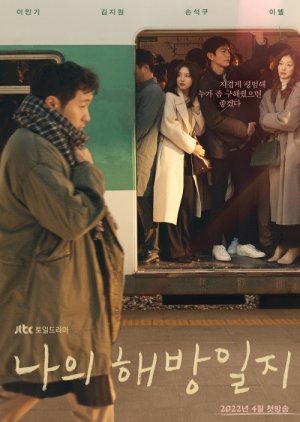








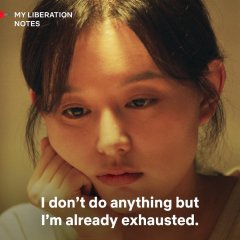



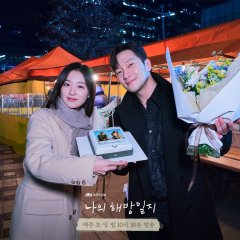
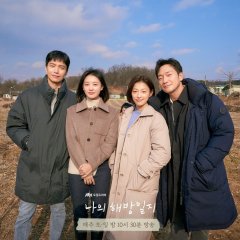
 1
1 2
2
